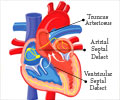
‘Longer-wavelength lights and gaming glasses are cheap and practical alternatives in the hospital rooms that can preserve brain function, reduce inflammation and lower the risk of death in cardiac patients.’
Tweet it Now
After seven nights of this regimen, the researchers evaluated the health of the models’ brain cells. Exposure to white light at night caused multiple poor outcomes. Cardiac arrest was more likely to be lethal for models in the white-light-at-night group, whereas the mortality rate in the red-light-at-night group did not differ from the group that stayed in darkness.
Exposure to white light at night also correlated to greater cell death in the hippocampus--a part of the brain that’s key to memory formation--and more aggressive inflammation overall. In fact, just one dimly illuminated night was enough to cause pro-inflammatory cytokines--tiny proteins critical to immune responses--to surge. This was only the case, however, if the light was white. Red light had no effect.
"When you see long-wavelength, blue light first thing in the morning, those long wavelengths set your circadian clock to precisely 24 hours. The problem is, if you see blue light at night--from your phones, TVs, computers and compact fluorescent lights--they’re disrupting your circadian system all night long. Those lights look white to us, but frankly, they’re mostly blue," explained Nelson, who--along with DeVries--receives support from the West Virginia Clinical and Translational Science Institute. His previous research has associated nocturnal blue light with higher rates of obesity, metabolic disorders and depression.
"Clearly light at night is required in patients’ rooms acutely after cardiac arrest and other major health events," said Laura Fonken, lead author on the study and an assistant professor at the University of Texas at Austin. "Our data suggest that a relatively simple shift--changing the light color from broad-spectrum white to a red hue--benefits outcomes in an animal model of cardiac arrest. If this also occurs in clinical populations, then it would be important because it would not require complicated clinical trials to implement for patients and could improve recovery from various other health events that require hospital stays."
Advertisement
"The cool thing from our perspective is, we believe these longer-wavelength lights won’t have that detrimental effect, and people will recover faster," Nelson said. If studies bear out the researchers’ hunch, gaming glasses may be an affordable, practical option for preserving brain function, reducing inflammation and lowering the risk of death in cardiac patients.
Advertisement
Source-Eurekalert












